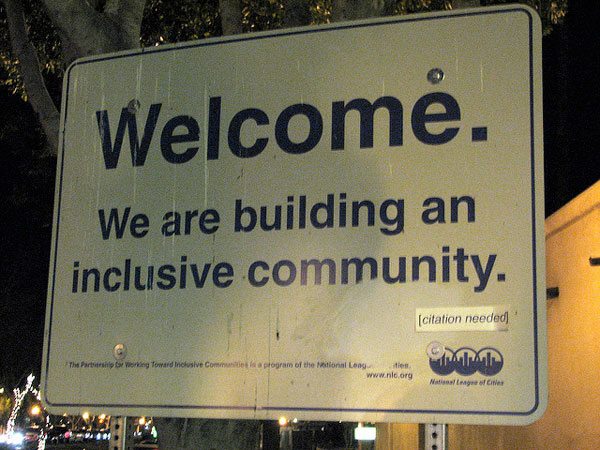
Two stories in the news last week highlight how critical it is for nonprofits and movements to advance powerful meaning-making that facilitates the outcomes we value.
One, covered by the Washington Post, among others, concerns Israeli Prime Minister Benjamin Netanyahu’s backing out of an agreement with the United Nations to resettle 16,000 Sudanese and Eritrean asylum seekers fleeing persecution in the West in exchange for settling the same number in Israel, after criticism from hardline anti-immigration forces in his party. Israel launched a deportation initiative in February, warning male African asylum seekers to depart within two months; those who did so would receive $3,500. Advocacy groups challenged the order in court and stalled the project until the now-retracted Netanyahu/UN resettlement proposal. The language used to describe the Sudanese and Eritreans quickly changed from “asylum seekers” and “migrants” to “illegal infiltrators.”
What is notable about this story, however, is the language used by Sharren Haskel, a member of parliament for the governing Likud party, in a BBC Newshour interview when asked about Netanyahu’s backtracking. She says,
(03:22) Unfortunately, this is an issue that the entire world is dealing with, not just Israel. It’s also Europe, with so many immigrants coming from, unfortunately, you know, bad countries. And I wish that we could’ve helped more…but, unfortunately, Israel has [a population of] 8 million…Accepting 50,000 immigrants into the country—and, don’t forget, this is not just them; once they get status, they can bring their family, they can bring their wife, they can bring their children, so you double, triple, sometimes even four times the amount of the people—unfortunately, we are unable to accept.
And, you know, this is the reality that we live, and we have to figure out how we can assist them in their own countries instead of, sort of, importing a lot of these problems into our country.
[…]
Unfortunately, we cannot see an option of accepting these immigrants. [Italics added.]
Meanwhile, in a news clip that immediately follows this one, and in an accompanying BBC article, we learn that, while “childhood obesity rates are rising in many parts of the world…in Amsterdam they are falling. The city’s healthy-weight program has seen a 12 percent drop in overweight and obese children since 2013.” As an attendant public announcement video tells us:
Teachers, doctors, and community leaders work together to encourage exercise, give advice on healthy a diet, and target the poorer parts of the city. Schools in the program encourage outdoor play. Sugary snacks are not allowed. And there are no fizzy drinks. Free fitness classes are offered to anyone needing extra help. Fast food advertising is banned on the city’s subway. And new cycle lanes are being built.
This concentration on Amsterdam’s poorer neighborhoods means that the city needs to engage immigrant communities from Surinam, North Africa, and Turkey. While it is here that the success has been the greatest, at first, there was opposition from parents, who expressed feeling that the schools were trying to tell them how to raise their children. But as the different stakeholders began to work together, with deputy programme manager Karen den Hertog talking about the program as a “whole systems approach in Amsterdam” and dieticians in the neighborhood helping immigrant communities create healthy hacks for their traditional foods, opposition quickly dissipated.
The Vice Mayor of Amsterdam, Eric van Der Burg, says, “It’s about leadership. Everyone is helping and that creates an environment in which we can change.” [Italics added.]
Sign up for our free newsletters
Subscribe to NPQ's newsletters to have our top stories delivered directly to your inbox.
By signing up, you agree to our privacy policy and terms of use, and to receive messages from NPQ and our partners.
These are very different orientations toward perceived differences between majority-white countries and black immigrant communities. The Israeli approach illustrated by Haskel is an antibody story; it frames the story as the need to guard against invasion, and a refusal to change. Further, while Haskel states ontologically that allowing these immigrants to stay in Israel just simply can’t be done, without explaining why or the factors considered in the determination—an authority coup where rationality is hidden—she seeks to rid Israel of these immigrants by sending them to a third country, which for some obscure reason should have a different stance and be willing to accept them. Amsterdam, on the other hand, started off with an inclusion stance: The immigrants are part of Amsterdam, they are a vulnerable population, they have among the highest rates of the issue being addressed, and they can be engaged toward a holistic solution.
As Susan Nall Bales notes in an NPQ article in our series on framing from the same week, headlined “You Say You Want a Revolution? How We Might Think about Guns and Social Movements,” resonant master narratives are one of the most valuable assets of movements and change agents. These narratives must do more than explain conflict events; they must also highlight shared values and tell listeners what they can do to participate in the change, oftentimes doing so while challenging an oppositional master narrative. Nall Bales writes,
Successful movements are about meaning-making. They challenge our acceptance of the world as immutable and provide both critique and optimism. As a result of the way they structure our understanding of the world, we feel engaged to reform and contest the status quo…
But not all stories that meet these basic criteria work for social change. Those that do focus our attention on the social systems and structures that need to be fixed by revealing how they impede the outcomes we value. These “how the world works stories” fill in missing pieces in people’s everyday repertoire. They invite what Daniel Kahneman calls “slow thinking,” overcoming the tendency to instantly evaluate all social issues through one’s partisan lens.
In “Leverage Points: Places to Intervene in a System,” Donella Meadows reiterates Nall Bales’ assertion, identifying meaning-making, or “the mindset or paradigm out of which the system—its goals, power structure, rules, its culture—arises,” as the highest intervention point in a system.
In a world of frame battles, fake news, and deadly hoaxes, such as the “Punish a Muslim” day, the need for nonprofit and movement leaders to focus on this high leverage strategy is critical for civil society. The need for sense making is at an all-time high, as indicated by another NPQ article on Wikimedia’s strategic direction, which found that users turn to it “for intrinsic learning or understanding a phenomenon in the media”—in other words, as a way to make sense of the world.
Further, an Intercept article last week reviews the paper “Ideologues Without Issues: the Polarizing Consequences of Ideological Identities,” by University of Maryland professor Lilliana Mason, which found that “Americans are dividing themselves socially on the basis of whether they call themselves liberal or conservative, independent of their actual policy differences.” The political identity people adopt is far more predictive of their social preferences than where they actually stand on issues. Mason calls this a sports narrative, where the goal is not humane policy, but beating your opponent.
She explains,
The problem is not a policy-based problem, because on average we’re relatively moderate in these policy attitudes. Talking to each other about political stuff is sort of the worst solution ever, because all that’s going to do is activate our political identities, which cause us to dislike each other….In general, the best way to get through this polarization is to start thinking of each other as human beings.
And therein lies the rub. Because for “liberals,” “progressives,” “activists,” “lefties,” or whatever we want to call ourselves, our real struggle is to not use the same dominant power frameworks that we’re fighting against, not even for a short-term victory. In short, as we strategize for just social change, we must not only be able to deconstruct exclusionary narratives (something the BBC reporter had a hard time doing with Haskel), including our own, but to generate inclusive narratives that compel values-aligned action.
We must call out and challenge the creation of and attacks against difference, the construction of Others, the unwillingness to accept change. As Mason concludes, this kind of identity politics, or disconnected stance, makes democracy hard because it precludes deliberation. As such, it must be directly addressed.












